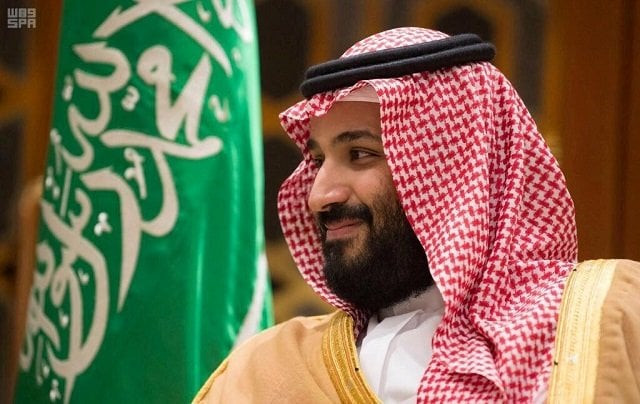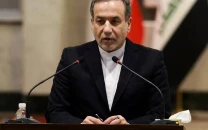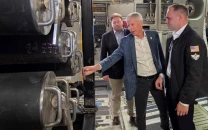Saudi Arabia blames Iran for tanker attacks but doesn't want war
Iran says "no shred of factual or circumstantial evidence" to prove Tehran's involvement in Gulf of Oman attacks

Saudi Crown Prince Mohammed bin Salman. PHOTO: REUTERS
Attacks on two oil tankers on Thursday, which the United States also blamed on Iran, have raised fears of broader confrontation in the region.
Iran has denied any role in the strikes south of the Strait of Hormuz, a vital shipping route and major transit route for oil.
The explosions that damaged the Norwegian-owned Front Altair and the Japanese-owned Kokuka Courageous occurred while Japanese Prime Minister Shinzo Abe was in Tehran trying to help ease rising tensions between the United States and Iran.
"The Iranian regime did not respect the Japanese prime minister's visit to Tehran and while he was there replied to his efforts by attacking two tankers, one of which was Japanese," Crown Prince Mohammed bin Salman was quoted as saying in an interview with the Saudi-owned Asharq al-Awsat newspaper.
'Alarming accusations': Iran says Trump trying to scapegoat Tehran over tanker attacks
"The kingdom does not want a war in the region but it will not hesitate to deal with any threats to its people, its sovereignty, or its vital interests," he said.
The Saudi crown prince also accused "Iran and its proxies" over May 12 attacks on four tankers anchored in the Gulf of Oman off the United Arab Emirates port of Fujairah.
Tehran and Washington have both said they have no interest in a war. But this has done little to assuage concerns that the arch foes could stumble into conflict.
The UAE's Foreign Minister Sheikh Abdullah bin Zayed Al Nahyan on Saturday called on world powers "to secure international navigation and access to energy", a plea echoed by Saudi Arabia after the incident sent crude prices soaring.
Thursday's attacks took place southeast of the Strait of Hormuz, a vital corridor connecting the energy-rich states of the Middle East with markets in Asia, Europe, North America and elsewhere.
According to the Energy Information Administration (EIA), 35 percent of the world's seaborne oil passes through the Strait of Hormuz.
Iran, which is struggling with crippling US sanctions, has repeatedly warned in the past that it could block the strait in a relatively low-tech, high-impact countermeasure to any attack by the United States.
Doing so would disrupt oil tankers travelling out of the Gulf region to the Indian Ocean and global export routes.
Meanwhile, British Foreign Secretary Jeremy Hunt said London had concluded Iran was "almost certainly" responsible for Thursday's tanker attacks.
Iran's foreign ministry responded on Saturday by summoning British Ambassador Rob Macaire over Hunt's "false remarks" and chided London for its "blind and precipitous alignment" with US views, a statement said.
Iranian Foreign Minister Mohammad Javad Zarif said this week that there is no "shred of factual or circumstantial evidence" to blame Tehran for the attacks.
UN Secretary-General Antonio Guterres has called for an independent investigation.
Damaged tanker arrives at UAE anchorage
A damaged Japanese tanker arrived at a UAE anchorage site on Sunday. The Kokuka Courageous was carrying highly flammable methanol through the Gulf of Oman on Thursday when it came under attack along with the Norwegian-operated Front Altair - the second assault in a month in the strategic shipping lane.
"Kokuka Courageous has arrived safely at the designated anchorage at Sharjah," the vessel's Singapore-based BSM Ship Management said in a statement Sunday.
The crew, who remained on board, were "safe and well", it said.
A damage assessment and preparations for transferring the ship's cargo would start "once the port authorities have completed their standard security checks and formalities", it added.
BSM Ship Management had said earlier Kokuka Courageous was heading towards the Kalba anchorage on the eastern coast of the United Arab Emirates, facing the Gulf of Oman.
The other ship, the Front Altair, has left Iran's territorial waters, multiple sources said Saturday.
It was "heading toward the Fujairah-Khor Fakkan area in the United Arab Emirates", the ports chief of Iran's southern province of Hormozgan told the semi-official news agency ISNA.
A spokeswoman for Frontline Management, the Norwegian company which owns the ship, said "all 23 crew members of the tanker departed Iran" and flew to Dubai on Saturday.


















COMMENTS
Comments are moderated and generally will be posted if they are on-topic and not abusive.
For more information, please see our Comments FAQ